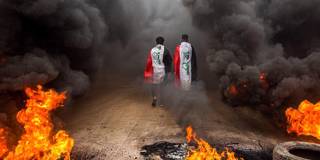Today’s Arab protesters have adjusted their tactics and objectives to reflect the lessons of the Arab Spring. But whether they can overcome the resistance of their governments’ repressive apparatuses to secure genuine governance improvements remains far from certain.
TEL AVIV – “A specter is haunting the rich world. It is the specter of ungovernability,” began an editorial in The Economist earlier this year, paraphrasing the opening line of the Communist Manifesto. But it is not only the West that is grappling with ungovernability. Across the Arab world, protesters have been making it clear that they will be ungovernable until their leaders deliver good governance.
The immediate triggers of the protests vary by country. In Algeria, it was President Abdelaziz Bouteflika’s announcement of his candidacy for a fifth term that sent people pouring into the streets. In Egypt, it was the government’s tightening of its food-subsidy program, which provides basic goods like rice to millions of people. In Iran, a 50% increase in previously highly subsidized fuel prices was to blame; in Sudan, high prices and bread shortages; and in Lebanon, a proposed tax on voice calls on apps like WhatsApp.
But these sparks caused conflagrations only because there was already plenty of kindling. Even after Bouteflika resigned, Egypt re-enrolled 1.8 million people in its food-subsidy program, and Lebanon canceled the WhatsApp tax, protests raged on.

TEL AVIV – “A specter is haunting the rich world. It is the specter of ungovernability,” began an editorial in The Economist earlier this year, paraphrasing the opening line of the Communist Manifesto. But it is not only the West that is grappling with ungovernability. Across the Arab world, protesters have been making it clear that they will be ungovernable until their leaders deliver good governance.
The immediate triggers of the protests vary by country. In Algeria, it was President Abdelaziz Bouteflika’s announcement of his candidacy for a fifth term that sent people pouring into the streets. In Egypt, it was the government’s tightening of its food-subsidy program, which provides basic goods like rice to millions of people. In Iran, a 50% increase in previously highly subsidized fuel prices was to blame; in Sudan, high prices and bread shortages; and in Lebanon, a proposed tax on voice calls on apps like WhatsApp.
But these sparks caused conflagrations only because there was already plenty of kindling. Even after Bouteflika resigned, Egypt re-enrolled 1.8 million people in its food-subsidy program, and Lebanon canceled the WhatsApp tax, protests raged on.